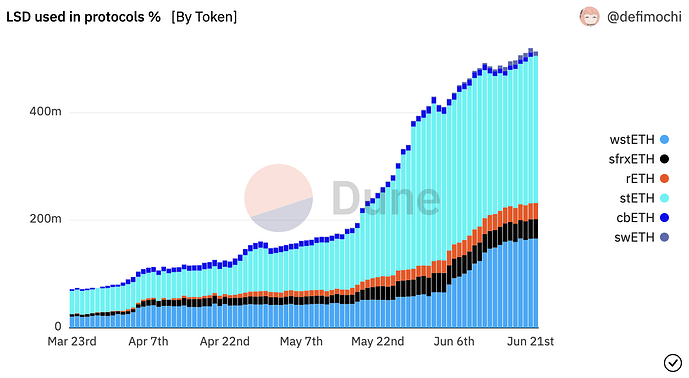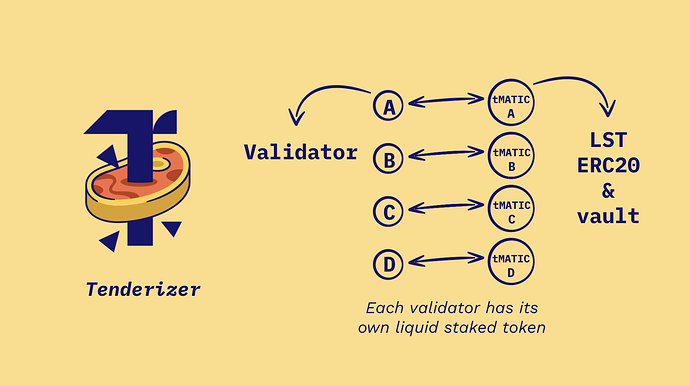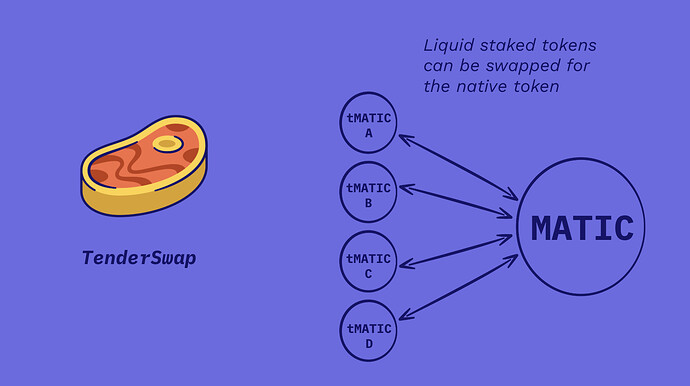Title: Amplifying the decentralization of MATIC Liquid Staking.
Introduction
We are building non-custodial MATIC Liquid Staking. The protocol is called Tenderize v2. This decentralized, permissionless and open-source protocol can transform a previously staked position into a liquid staked token (LST), which Tenderize calls tTokens.
This new tToken cab instant liquidity because it can be swapped for the unstaked version of the same asset through Tenderize’s application specific AMM: TenderSwap v2. Users can always simply unstake as well and wait 3-4 days(80 checkpoints) to reclaim their MATIC .
Motivation: Decentralization
Decentralization has always been one of the strategic priorities for Polygon. As participation in LSTfi increases, it’s crucial to develop and implement a decentralized approach from the onset.
LST/LSD: Liquid staking tokens (formerly Liquid staking Derivatives) have gained traction according to recent open data on Dune.
Even with 100 validator sets, there must be a mechanism to decentralize delegation amongst those 100 validators and not silo stake to large firms with enough MATIC to run a validator.
Any MATIC holder, holding as little as 1, can stake to any MATIC node through Tenderize v2, delivering lower barriers to entry for validating and decentralizing the stake at a delegation level.
Tenderize V2 Launch and Incentives Offered
Tenderize is allocating 3% of our governance token, WAGYU, total supply to allocate to validator partners or MATIC whales interested in delegating through Tenderize v2.
Our launch TVL target is $13.5M MATIC, if this number is hit, those staking MATIC through Tenderize v2 can expect another 10-20% in WAGYU on top of the native 5.22% MATIC staking yield.
The 20-30% APR on top of native MATIC staking yield is generated from:
-
grant worth of 10% of staked value for validators and 5% for whales.
-
10-20% from airdrop.
-
10% each year from staking incentives.
ROI calculator
If you want to project your ROI into the future when staking in our protocol on launch day, we have created a calculator to help showcase expected rewards. You can find it here.
Key Benefits to Polygon Validators
- Validator Grant & Increased Yield: Participating validators can benefit from a grant equal to 10% of the initial stake which half is used to boost your validators yield for delegators
- Liquid Stake: Validators can bypass the unstaking window of their tTokens by swapping to unstaked MATIC at any time via TenderSwap.
- Visibility & Stake Increase: Participants will gain exposure through our go-to-market materials and have the chance to accept community delegations on launch day, effectively increasing their stake.
- Upside exposure: Thanks to the airdrop, staking yield and validator grant, users participating in Tenderize v2 launch enjoy the upside benefits of WAGYU while simultaneously decentralizing Polygon.
Technical Architecture for decentralized LST infrastructure
Tenderize v2 is a fully decentralized and permissionless version of Tenderize v1, which has been secured over $2M with no exploits for over 12 months. It possesses the same robust, secure, and efficient technical backbone, using core modules from Tenderize v1. Version 1 lives on Arbitrum and Ethereum L1.
How the decentralized LST infrastructure works
- Tenderizer: Decentralizes LST tokens to the core
- TenderSwap DEX: Makes LST tokens liquid
Decentralizing LST tokens to the core
Any validator can self-delegate through Tenderize v2 - minting a LST representing their stake. This is called a tToken. Users can delegate stake to any validator.
Making LST tokens liquid
Once the tTokens (LST) are minted the holder has two options;
- A MATIC holder can either unstake by waiting 7 days for the unstaking period
- Or use TenderSwap DEX for instant liquidity swapping your tMATIC tokens for MATIC.
TenderSwap is an application-specific decentralized exchange (DEX). The application it’s specific to is liquid staking. It provides liquidity to tTokens (LSTs) through a shared liquidity pool model, as illustrated below. This model removes the need for LST issuers to fund on chain liquidity incentives.
Launch & Participation
In anticipation of this major release, we will be rolling out our official testnet this summer, providing an early glimpse into the Tenderize v2 protocol and its functionalities. All launch partners can interact with the code, testnet and review audits before joining the cohort.
Conclusion
Our proposed grant program for Polygon Validators and large delegates is a golden opportunity for validators to increase their return on staked MATIC while adding value to the network via decentralization. By fostering decentralization while utilising LSTs, we aim to make underlying networks resilient and robust. The more validators use Tenderize V2, the more resilient POS networks will be.
We invite Polygon validators to join our mission in amplifying the decentralization of MATIC liquid staking. To apply Click here, or you can directly reach out to us on Telegram: @OpsChefSalim or @AlecShaw.


